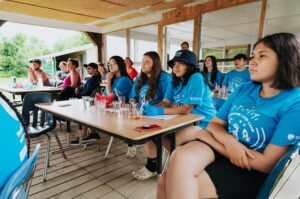Elders bring knowledge forward at Actua InSTEM camp in Dokis First Nation

By Kelly Anne Smith
DOKIS FIRST NATION—A science, technology, engineering, and math (STEM) camp in Dokis First Nation will have youth learning on the land.
Doug Dokis is the Senior Advisor for Actua’s National Indigenous Youth in STEM Program. He explains that Actua’s InSTEM program is a network of 43 university and college programs that serve the local First Nations across Canada. The programming is delivered by undergrad students at each of those universities and colleges.”
Dokis is calling for the Indigenous perspective to be integrated into schools.
“We understand or we believe that Indigenous people have always known STEM – science, technology, engineering, and math. And that knowledge comes from Indigenous knowledge of the land – astronomy, biology, physics- all based on land-based knowledge,” he explains. “Our role is to work with local communities to have Elders bring that knowledge forward and work with communities to align that knowledge with current-day STEM principles and practises.”
There is profound significance in cultural activity and STEM, says Dokis.
“An example would be in Indigenous knowledges. Indigenous people believe that everything is animate including, let’s say, a rock. Everything has spirit and we’ve always known that and operated our ceremonies with that belief.”
Dokis adds that Western science is shifting, opening to Indigenous knowledge systems of constant motion.
“Western science is now starting to recognize that a rock is in constant motion at the atomic level, which is quantum physics. We’ve always known that and always said that, but Western science never acknowledged the principals of animate and inanimate. So, Western science has always separated the human experience, the human understanding from science.”
Dokis advocates for the importance of land learning to embrace science.
“There is science and technology all around us yet the education system has separated that and doesn’t teach it from that perspective. Plants, rocks, animals, star systems, galaxies – all of that knowledge that Indigenous people have always known about has not been recognized the same as science in Western worldviews and belief systems.”
Dokis says the camps provide teachings for kids of all ages.
“It’s an opportunity to see the relevance between the immediate environment and the impacts that we have on that environment with current knowledge systems.”
Having university and college students engage with the youth in the InSTEM camps provide mentorship adds Dokis.
“It’s the young teaching the young. The Indigenous worldviews of teaching is that everybody learns from the next generation. Our trainers work with the undergrads. The undergrads work with the youth. It’s a transfer of knowledge.”
Four core STEM instructors and Canadore instructors will oversee the students with the Elders. Dokis explains that the 25 students at Actua’s Dokis First Nation camp will be exploring what is relevant to the community.
“Here in Dokis, there’s a lot of work done on land management and water systems. Climate change is now a big thing, so the students will look at those things. They’ll do work with the water. They’ll do work with invasive species.”
Dokis says Indigenous land-based learning systems have to be in the main education system.
“All kids need to learn the importance of that knowledge that comes from Indigenous knowledges of the land.”
Additionally, the high school credit for attending the InSTEM camps has to be recognized, says Dokis.
“It not only informs future leaders on climate change and care, but it also informs other students and teachers, if we do teacher training, too, that systemic change is required in the way we teach science, technology, and math. It is not something only for the high achieving students, it’s for everybody.”
Dokis says the goal of InSTEM programming over the past nine years has been systemic change.
“Now you see it in environmental technology programs. And they are calling it a new approach to education, whereas, Indigenous people have educated always from the land.”
Dokis himself has noticed the change Actua has made at multiple levels.
“At the micro level, I work with kids now that came through these programs 10, 15 years ago that are now leaders in big organizations. Their knowledge systems and ways of being are changing organizations,” Dokis explains. “We now have partnerships with five school boards across Canada that are integrating the InSTEM model into their whole school system from K-12…”There’s a huge demand in teacher training from us to provide a land-based teacher training so that the educators themselves have a better idea of how to bring it into the classroom on a day to day basis…Given the current situation in the world, politicians and funders, and education leadership need to invest more and work more closely with us and Indigenous communities to create the right environments to align and integrate Indigenous knowledges into the school systems.”

